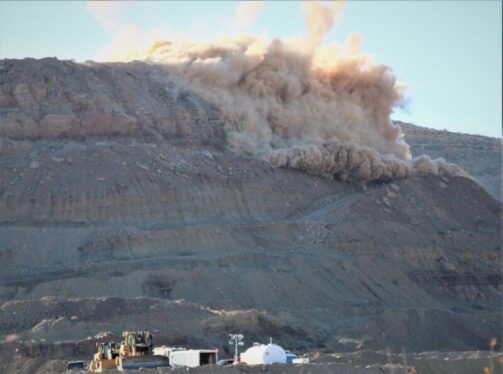
Enlarge / Blasting taking place at the fossil-rich site. (credit: Bureau of Land Management)
Blasting has begun in an area known as “Community Pit #1” near Las Cruces, New Mexico, as part of a three-year effort by the Bureau of Land Management (BLM) to level dangerous high walls left in a once heavily mined pit (among other work). But the site is the only known location of certain fossils in the entire state, and some experts question whether the BLM is doing all that it can to balance maintaining public safety and preserving the fossils it is tasked with protecting.
In the Pit
The Community Pit is an area of approximately 85 acres near Prehistoric Trackways National Monument, which hosts a large range of vertebrate footprints. It became a source of building material in 1969, but this use ended in 2007. Scars from several decades of mining remain in the form of very high, very unstable rock walls. Current remediation efforts started because the “BLM observed an increase of visitors climbing upon and underneath undercuts and high walls,” explained William Wight, the BLM Las Cruces District spokesperson. “Due to increased reporting of this dangerous situation in late 2022, the BLM Las Cruces District Office made the Community Pit #1 public health and safety project a top district priority.”
The scope of that project involves “blasting, recontouring, seeding, and re-establishment of vegetation” in about 50 acres of the Community Pit. Blasting will largely impact the top layer of sediment making up the 150-foot walls. It is the rock layer lower in the pit—a geologic formation known as the Robledo Mountain Formation—that contains the fossils unique to the Community Pit: resting and burrowing traces made by jellyfish and horseshoe crabs from the Early Permian (approximately 290 million years or so ago). This is the only known location of jellyfish and horseshoe crab traces in New Mexico.
Read 22 remaining paragraphs | Comments




